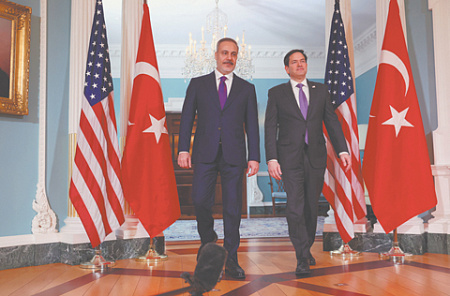
Turkey and the United States have agreed to begin technical negotiations to lift defense sanctions imposed on Ankara five years ago for the purchase of S-400 anti-aircraft missile systems from Russia. This means that the republic can return to the American program of fifth-generation F-35 fighters and unfreeze licenses for the export of US defense products. In return, Washington offers to disable the S-400.
Sources of the American edition of Al-Monitor reported on the imminent start of interdepartmental negotiations between the United States and Turkey, which will be devoted to the lifting of sanctions. “Both sides have clearly demonstrated their political will to remove obstacles to cooperation in the defense industry. Technical meetings will be held to solve existing problems,” the source said.
He was referring to the restrictions in force against Ankara under the law on Countering America’s Adversaries through Sanctions (CAATSA). They were introduced in 2019-2020, during Donald Trump’s first term as president, in retaliation for Ankara’s purchase of one regimental set of Russian S-400s at that time.
An agreement to start the process of lifting US sanctions was reached during the visit of Turkish Foreign Minister Hakan Fidan to Washington. He met with his American counterpart Marco Rubio. According to the press service of the State Department, the parties discussed “cooperation on key issues in the field of security and trade,” as well as mediation initiatives in Ukraine and Transcaucasia. At the same time, it follows from the statement of the State Department that Rubio “stressed the need for close cooperation to support a stable, united and peaceful Syria, which will not be a base for international terrorism or a platform for Iran’s destabilizing actions.”
However, Turkey’s return to the F-35 program was one of the top priorities, as could be understood from the messages on the eve of the meeting. Fox News channel sources recently reported that Washington had offered Ankara to negotiate the supply of fifth-generation fighter jets. They were frozen in 2019, despite the fact that by that time the Turkish side had paid the United States $ 1.4 billion for the planes. At that time, the White House explained the refusal to transfer fifth-generation fighters by saying that “the F-35 cannot exist with the Russian intelligence gathering platform (meaning the S–400 -NG), which will be used to study its advanced capabilities.” Now Trump wants to return to this issue.
Washington offers Ankara to either disassemble the “four hundred” or transport them to the American military base Incirlik in Turkey, the interlocutors told Fox News. One way or another, Russian-made air defense systems must be disabled, Washington insists. In return, the Turkish side is offered access to the F-35, and the unfreezing of export licenses for the Turkish Defense Industry secretariat, allowing for purchases of American military equipment.
In the past, Turkish officials have categorically refused to even consider options for dismantling the S-400. However, it is generally believed that Ankara now needs American support against the background of the protest wave that swept through Turkey’s largest cities due to the arrest of prominent opposition leader Ekrem Imamoglu, the mayor of Istanbul.
In the week since the protests began, Washington has demonstrated that it is not against providing at least tacit support to its Middle Eastern ally. Turkish diplomatic sources told Reuters that during the meeting with Fidan, the US Secretary of State did not express any concern about mass arrests and the suppression of protests in Turkey, despite the fact that the State Department’s message briefly stated that this topic was allegedly raised during the conversation. And Trump said this week that Turkey is a “good country” and President Recep Tayyip Erdogan is a “good leader.”
Erdogan himself recently expressed confidence that during Trump’s second term, bilateral relations between the United States and Turkey will receive a new development, despite attempts by some hostile forces to undermine this process. The two allies are currently preparing a high-level summit, which is expected to reach mutual understanding on many issues.
The protests in Turkey itself continued on March 27. “According to the latest data, 260 of the 1,879 suspects detained during operations to suppress unauthorized demonstrations were arrested by the court,” Turkish Foreign Minister Ali Yerlikaya said on Thursday. “The judge ordered that 124 more suspects be subjected to judicial control measures, including a ban on leaving their homes. The proceedings against the suspects are ongoing. Unfortunately, 150 of our law enforcement officers were injured.”
Yerlikaya expressed confidence that the street protests in the country “have jeopardized peace and tranquility in Turkey.” “Our police were attacked with acid and Molotov cocktails. Moral principles were violated. Justice is done in the courtroom, not on the streets,” he said.
